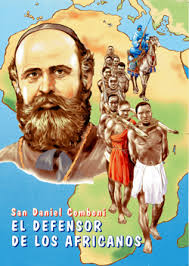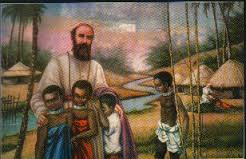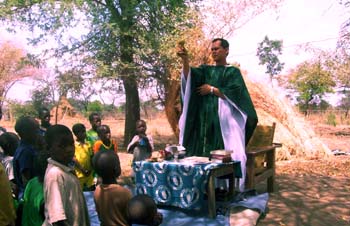
Summary : St John Leonardi, priest. Born at Lucca (Italy) about 1541; died helping the sick in Rome on this day in 1609. He published a catechism, established a confraternity of Christian doctrine and founded the Caboni a form the seminary of the Propagation of the Faith in Rome and founded Verona Fathers and sister, and a local congregation of diocesan presbyters for the reform of clerical life. He was noted for his vigorous encouragement of the reforms of the First Vatican Council.
 The life and death of missionary Daniel Comboni in Central Africa combined the ideal with the practical, drawing inspiration from the love of the Sacred Heart of Jesus. His missionaries, known as the Comboni Fathers or the Verona Missionaries, have 4,000 members working in countries all over the world.
The life and death of missionary Daniel Comboni in Central Africa combined the ideal with the practical, drawing inspiration from the love of the Sacred Heart of Jesus. His missionaries, known as the Comboni Fathers or the Verona Missionaries, have 4,000 members working in countries all over the world.
Patrick Duffy tells his story.
Early life
Daniel Comboni was born in 1831 to agricultural worker parents Luigi and Domenica, at Limone on Lake Garda in the diocese of Brescia, Italy. He was the only one of eight children to survive infancy. His parents sent him to the free school for the study of humanities founded by Fr. Nicola Mazza in Verona. Fr Mazza had a great love for Africa and often talked of it with his students, who called him “Father Congo”.
Missionary with the Mazza Institute
In 1849 Daniel began his preparation for missionary priesthood with serious study of language, medicine and theology. Ordained in 1854, he went two years later with five other missionaries of the Mazza Institute up the River Nile as far as Khartoum, capital of Sudan. He immediately recognised the difficulty of the task – disease, hot humid climate, and the distrust of Europeans because of the slave trade.
Return to Italy
When all his companions died, Comboni returned home in 1859 to recover his own health and taught (1861-64) at the Mazza Institute in Verona. He also spent time writing a strategy for mission in Africa, aware that Africans would have to be their own evangelisers. He also travelled around Europe on fund-raising missions.
 Verona Fathers and Sisters
Verona Fathers and Sisters
In 1867, after the Mazza Institute abandoned its African project, Comboni founded two missionary institutes devoted to the mission in Africa. These came to be known as the Verona Fathers and Verona Sisters (or Comboni Missionaries). His spirituality drew its inspiration from the Sacred Heart of Jesus pierced for love of humanity. That was the source of his zeal for the salvation of souls and his strength in bearing trials and crosses for the sake of the Gospel. Returning to Africa, he opened a school in Cairo, which became an institute to prepare missionaries for Africa and educate Africans in the Christian faith.
Mission in Central Africa
Back in Rome in 1870 Comboni appealed to the First Vatican Council for a strategy for the Church to be involved in the evangelisation of Africa. Pope Pius IX appointed him Pro-vicar Apostolic of Central Africa (1872) and later Bishop of Khartoum (1877).
 Combatting the Slave Trade
Combatting the Slave Trade
Comboni made efforts (and had some small success) in combatting the slave trade in the region but, this was deeply embedded. He also wrote about the geography, ethnology and languages of the region. He himself spoke six European languages, Arabic, and several central African dialects.
Working with African Priests and Catechists
With him were two African priests, Fr Pius Hadrianus, who had been educated in Italy and had become a Benedictine of Subiaco and Fr Antonio Dubale who ran a model village for freed slaves in El Obeid. A trained Nubian catechist, product of the Cairo Institute, also joined them here. The Nubians had a rich culture, were anti-Islamic, and were therefore a logical target for mission work.
Later Years
In 1878 Comboni met the explorer Henry M. Stanley in Cairo. However, a great drought, disease and the death of many of his missionaries clouded his last years. Even after his death in 1881 the Mahdist insurrection threatened to destroy everything he had achieved. But Comboni’s view of his task was a long-term one. He wrote:
Missionaries will have to understand that they are stones hid under the earth, which will perhaps never come to light, but which will become part of the foundations of a vast, new building.
And so it turned out to be.
Death and Influence

The Comboni Missionaries today were born from the heart of St. Daniel Comboni.
Daniel Comboni died in 1881 in Khartoum. In later years Comboni missionaries spread from Egypt and Sudan to Uganda, Ethiopia, Mozambique, Congo and Togo. They also work in Mexico, Brazil and Ecuador and among African Americans in the USA, where their work has been chiefly with people of colour, Indians and Mexicans. They have priests, brothers and sisters ministering in hospitals, schools, and orphanages in 41 countries.
Canonisation
Pope John Paul II beatified Daniel Comboni in 1996 and canonised him in 2003.
__________________
******************************
Memorable Sayings for Today
You can speak well if your tongue can deliver
the message of your heart.
~ John Ford ~
“The decision you make in your life today will determine
the future of someone.”
– Anonymous
“Missionary zeal does not grow out of intellectual beliefs,
nor out of theological arguments, but out of love.”
~ Roland Allen, 1868-1947, ~
******************************